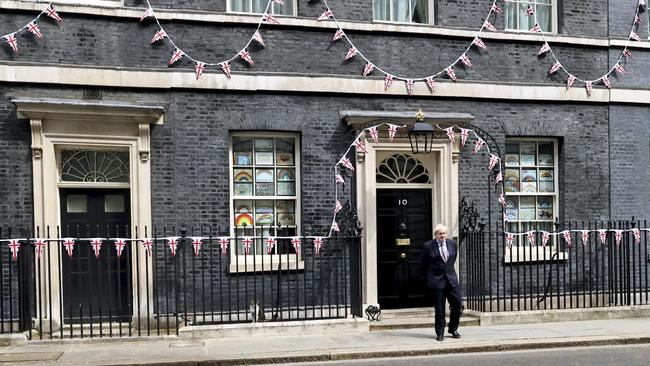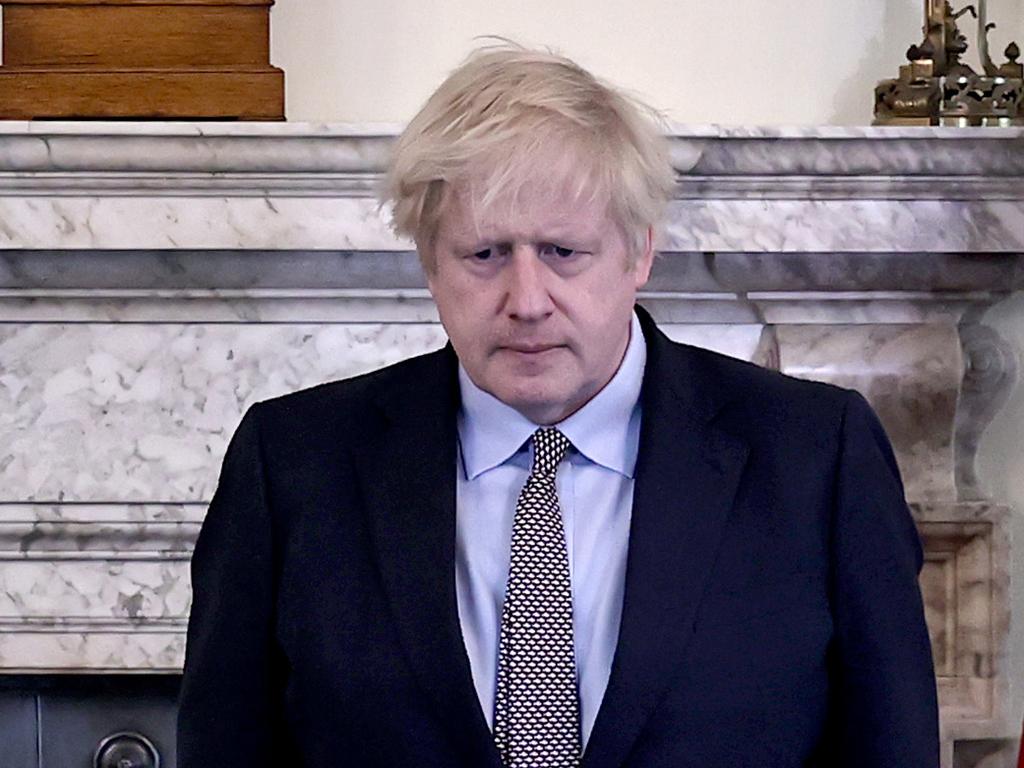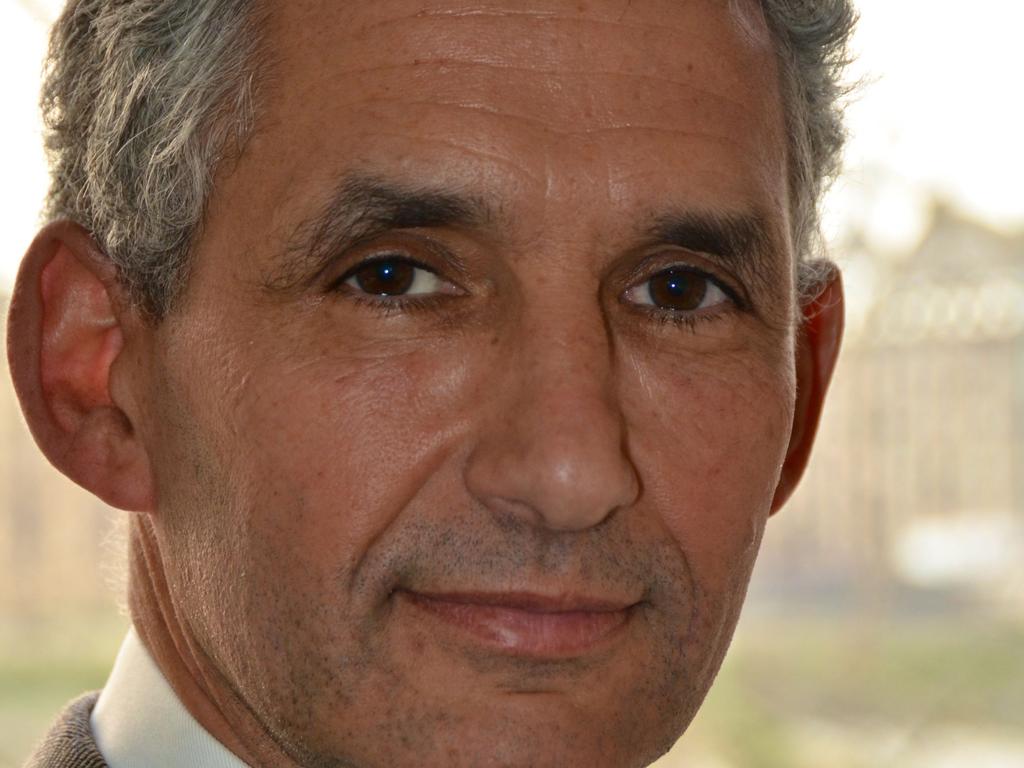No more ‘priestly mumbo-jumbo’: Boris Johnson needs to take control
The British leader should level with his public. The growing need is for intellect, clarity and an end to nonsense about the Blitz.

“Chocks away!” Or that’s what some in the news media thought they’d heard. “Magic Monday!” trilled the Daily Star this week, skipping past the weekend and the prime minister’s Sunday-night curtain-raiser on prospects for relaxing the lockdown. “Hurrah! Lockdown freedom beckons” rejoiced the Daily Mail. For The Sun we can look forward to “Happy Monday”.
Or can we? “Abort! Abort! Take-off abandoned.” That’s what others appear to be hearing. For The Times on Friday it was “PM to keep Britain in lockdown till June”, and for the Financial Times: “Boris Johnson urges ‘maximum caution’ over easing lockdown.” We’re at a loss to know who in government is trying to communicate what.
Is there anyone in the cockpit? It’s time to ask whether Boris Johnson is up to the job. A nation has a profound need to believe that, whether or not we know what’s going on, somebody does, and that would normally be the prime minister. A national leader cannot always tell us what’s happening or what’s coming – there may be reasons for caution here – but we need to be persuaded that the leader is leading, in charge, across his brief, able to bang heads together and, when key decisions loom, equipped and ready to take them.
Well, here he is at prime minister’s questions this week. I quote at length and include the ums and ers because the halting prolixity, waffle and intellectual confusion need to be flagged up. An increasingly formidable [Labour Party leader] Sir Keir Starmer had asked why Britain had abandoned its testing program in March, only to resume it now.
The Prime Minister: “A-a-as I think is readily apparent, Mr Speaker, to everybody who has studied the, er, the situation, and I think the scientists would, er, confirm, the difficulty in mid-March was that, er, the, er, tracing capacity that we had – it had been useful … in the containment phase of the epidemic, er, that capacity was no longer useful or relevant, since the, er, transmission from individuals within the UK, um, meant that it exceeded our capacity … As we get the new cases down, er, we will have a team that will genuinely be able to track and, er, trace hundreds of thousands of people across the country, and thereby to drive down the epidemic. And so, er, I mean, to put it in a nutshell, it is easier, er, to do now – now that we have built up the team on the, on the way out – than it was as, er, the epidemic took off … ”
Mr Johnson went on to throw Britons a promise to test 200,000 people a day by the end of this month. Sadly, social distancing means we couldn’t see the face of the health secretary as this pledge was made. Later, asked about public transport, Mr Johnson started burbling about a new golden age of cycling. Rush-hour Tube trains carry more than a thousand passengers every two minutes.
Prime ministers come in different shapes and sizes and there isn’t a single ideal. There are details people: Margaret Thatcher liked to be down in the engine room, sleeves up. Tony Blair was readier to step back and leave the rather heavyweight team of cabinet colleagues he assembled to get on with the job – but you never doubted who was boss, or his intellectual command of his own government’s plans.
I suppose the case for Mr Johnson’s leadership was that he would be more of the second type, assembling a crack team, giving them the authority to lead in their own areas of expertise, but conveying always a uniting sense of purpose and infusing the whole with that bouncy sense of optimism that is his singular gift.
One begins to wonder, however, whether that word “singular” should be replaced with “single”, and whether even this gift is wearing thin. Mr Johnson does not look well and doesn’t sound as though he’s leading. I do not like what I’m hearing from insiders about confusion in Downing Street, about a lack of that needed sense of a collegiate cabinet pulling together behind a coherent mission, and about hostilities and factionalism between ministers, and with No 10.
Most dismaying of all is the intellectual weakness of the mangled case the government is putting across. What is all this nonsense about the R-number, when all that means is whether or how fast the virus is spreading? Media deference to the priestly mumbo-jumbo reminds me of the bourgeois gentleman in Moliere’s comedy of the same name, deeply impressed to learn from his tutor that he has been speaking something called “prose” all his life. Reproduction rate means spread rate and here we can make only educated guesses from a hugely patchy picture in which many of the numbers aren’t available and averages are of limited use.
If we’re beating the virus back we’re not beating it back because we’re getting the R number down: the R number is down because we’re beating it back.
And who at the top of government is treating the population like grown-ups and explaining that relaxing lockdown will inevitably result in new outbreaks, and that instead of screaming “Argh! Second wave!” we shall need calmly to contain those outbreaks with perhaps new, partial lockdowns here and there? Is Mr Johnson ready to face down the trade unions and explain that precise regulations governing reopened workplaces are impossible, that every business, every space, staircase, production line is different, and “use your common sense” must be the limit of workable advice?
This is not apocalypse and we’re not facing an enemy that threatens to kill all or even most of us. That Mr Johnson himself nearly died does not mean he understands better. The suggestion that he has undergone some kind of transfiguration troubles me. If a prime minister needs direct personal experience of a danger to comprehend danger to others, then heaven help us. Besides, intensive care may have warped his judgment, leading to jumpiness.
The growing need is for intellect, clarity, an end to nonsense about the Blitz and boasts about how well Britain is doing (we aren’t), and a readiness to talk to citizens as adults.
Regrettably, Mr Johnson has an Etonian distrust of intellect among colleagues, and a wariness of explaining things honestly and properly to hoi polloi.
Perhaps everyone is waiting for the old Boris to bounce back, but is “back” the word? He was once noisier and bouncier, for sure, but was his ever a good, problem-solving mind? Can you remember any big dilemma of government he ever tackled and sorted? Any unpopular policy he ever won us over to?
There is a hole at the top of government and I doubt it’s Boris-shaped. If it is, we shall see during his national address on Sunday.
The Times





To join the conversation, please log in. Don't have an account? Register
Join the conversation, you are commenting as Logout